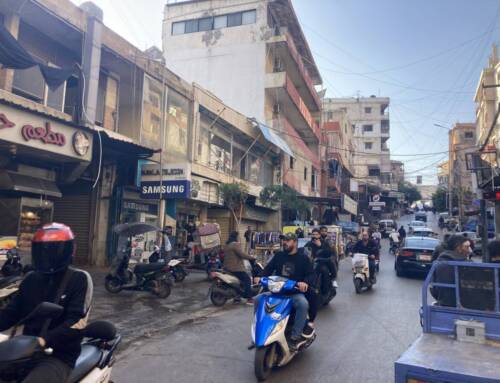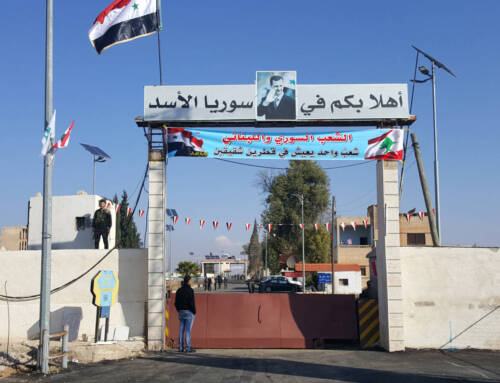Losing lives, losing livelihoods: the ordeal of the Syrian workers at the Beirut port after the blast
Thirty minutes through a fence at the Beirut port. This is how Khadija Airout saw her brother Mustafa for the last time.
25 August 2020
Sunken ships at the Port of Beirut, 20 days after the blast. 24/08/2020 (Syria Direct)
BEIRUT — Thirty minutes through a fence at the Beirut port. This is how Khadija Airout saw her brother Mustafa for the last time. It was January, and their mother had traveled from Syria to Lebanon to visit them. Khadija has been living in Tripoli for the last four years after she fled her family home in the city of Baniâs in the coastal province of Tartus due to the Syrian war. Mustafa was part of the crew of the Orient Queen cruise ship, docked in the Port of Beirut.
Mustafa, given his lack of residency, was not allowed to leave the Beirut port. “We went to the fence at the port, it was just half an hour to say hello. That was the only way to see each other, it is inhumane,” the 26-year-old Syrian refugee told Syria Direct from her home in Tripoli.
Mustafa had spent the last eight years as a sailor to provide for his wife and 3-year-old son living in Syria. One week before the August 4 explosion, he asked Khadija to meet again. He was craving Syrian food.
Then the third biggest non-nuclear explosion of all time shook Beirut and sank the Orient Queen. The blast has claimed the lives of 182 people according to the Health Ministry, while a dozen remain missing, per the UN Office for the Coordination of Humanitarian Affairs (OCHA) figures.
“We saw the explosion on TV, we tried contacting him but there was no line,” Khadija recalled. Her husband toured the hospitals for two days to no avail. “We tried to locate him via Facebook groups, but his name was not in the injured list and we lost hope.”
Khadija’s father traveled from Syria to Lebanon to undertake a DNA test to see if there was a match among the unidentified bodies. On August 15, the family received a call from the Al Rassoul Al-Aazam Hospital informing them they had Mustafa’s remains. The next day, the Rafik Hariri University Hospital informed them they also had remains of Mustafa.
Mustafa, 30 years old and the eldest of four siblings, was the breadwinner of the family. “For my parents, he meant the world, he was really loved,” said his sister while playing a video of Mustafa’s burial in his hometown amidst crowds mourning him.
To date, it is unclear how many Syrian workers at the port were killed in the explosion. Syria Direct contacted the Syrian Embassy in Beirut and requested, unsuccessfully, an update on the initial figure they released on August 8 of 43 Syrians killed in the blast.

Azzam Yahia Hamu’s name was on that list. The 55-year-old from the city of Hama had been working as a mechanic at the Port of Beirut for the last 30 years. “I was talking to him on WhatsApp. He was at the port and told me there was a fire. Five minutes later the connection was lost,” his 24-year-old son Muhammad told Syria Direct via a phone call from Hama. Three days after the blast, he buried his father in Hama. Azzam’s salary was key to sustaining his five children. But the devaluation of the Lebanese currency was taking its toll: his 600,000 Lebanese pound (LBP) salary, $400 at the official exchange rate, had decreased to $85 at the parallel exchange rate.
“We make our living from the port, now all is gone”
Over 70,000 workers have lost their jobs as a result of the explosion. Karantina, one of the neighborhoods most affected by the blast, is home to many Syrian port workers.
Sitting on the patio of Abdullah’s house amidst debris, Nagib, Khaledi and Ibrahim join him to chat about their uncertain future. They are daily workers at the port who used to earn between 30,000 and 70,000 LBP ($20-$46 at the official exchange rate, but $4 to $10 at the parallel market rate) per day to load and unload freights. None of them, they said, was aware of the explosive materials stored at the port. They are lucky; all of them worked the morning shift on the day of the explosion.

Nagib Mahmoud al-Uboud, a 52-year-old originally from the city of Kafr Zita in Hama Countryside, has been working for 24 years at the port to support 14 family members. He left the port one hour before the explosion. “Now the work has stopped, it is a disaster for us, we don’t have a monthly salary, we are daily workers,” explained Nagib.
“Our kitchen is gone, all the wood broke. The neighbors have helped us clean the rubble,” added Abdullah Ahmad Mustafa, from Hama’s countryside, while pointing at the damaged façade of their home. According to this 31-year-old Syrian, no organization has offered them help yet. He has been working at the port for eight years; his main concern is to go back to work to support his wife and his newborn baby.
For Khaledi Mubarak, 36-year-old and father of three, he is unable to afford the 500,000 LBP rent. “We make our living, we eat from the port. Now all is gone,” said this Syrian from Kafr Zita. He spends 70,000 LBP per month on milk for his 9-month baby. “I don’t even have money for milk, I came here in 2012 because of the Syrian war, we are just trying to make a living, now we are stagnated. Let us live in dignity.”
The United Nations warned last week that 55% of Lebanon’s population is “trapped in poverty,” doubling last year’s rate. Syrian refugees endure an added layer of vulnerability. The World Food Program estimates that out of the approximately 1.5 million Syrian refugees in Lebanon, 1.2 million live on less than $2.9 per day.
“If we work, we eat, if we don’t work, we are hungry until the next day,” said Ibrahim Abdullah, a 31-year-old from Kafr Zita, summing up the ordeal. He has been working at the port since 2013 and says he would return to Syria if the situation were safe. For now, this father of two still hopes to be resettled in a third country: “anywhere‒UK, Germany, France, Australia, I don’t mind.” Since 2011, 100,000 Syrian refugees have been resettled from Lebanon, but given the COVID-19 travel restrictions, resettlement is on hold.
Kuwait pledged funds last week to rebuild the wheat silos at the Port of Beirut, but it is unclear when the port will be fully operational and workers will be able to go back to work.
Muhammad al-Sattouf supervises the work of the handymen fixing his roof destroyed by the blast. This 39-year-old from Hama city was filming the fire from his balcony when the explosion engulfed his family. He sustains an injury on his arm and his wife is bruised. After 17 years of working in the port, his 500,000 LBP salary is barely enough to cover the 325,000 LBP rent, but he does not contemplate returning to Syria. “That is how we survive. If the situation in Syria was safer, I would send my wife and two kids there,” he added.

In a parallel street, Wala Ahmad al-Abed sits in her living room awaiting news from her husband Salah Ahmed al-Jalad, a maintenance worker at the port who was caught in the blast. “He has been in the hospital for 10 days because he had a brain hemorrhage,” she said. He is receiving treatment in the Rafik Hariri University Hospital, but Wala explained that now the doctors want to do a magnetic resonance imagining (MRI) and its cost [600,000 LBP] is unaffordable for the couple, originally from Syria’s eastern city of Deir e-Zor. A UNHCR team went that morning to assess her situation. “My husband cannot work now, and we don’t know if he will receive this month’s salary,” said Wala. Going back to Syria is not an option for them: “My family has been internally displaced. They are from Deir e-Zor and are now in Aleppo, I don’t have a house to go back to.”
Wala was home with her four children when the blast shattered their windows. “During all the war in Syria, we never saw an explosion like this one. Now my kids scream at every bang of the door,” explained this 30-year-old mother.
Seeking accountability
Twenty-five people have been arrested so far in the investigation enquiring why 2,750 tons of ammonium nitrate were stored next to a populated area for more than six years. The case will be heard at the Higher Judicial Council, a special court that “does not meet the conditions for a fair trial,” according to an article published by Nizar Saghieh, Executive Director of the Legal Agenda society. Saghieh also criticized the failure of the authorities to protect the crime scene and labeled the nomination of judge Fadi Sawan for judicial investigator “negative” given his record of “rarely contradicting” the requests of the Military General Prosecution.

Last Friday, August 14, in a tent located 700 meters from the site of the explosion, a group of families of the victims organized a press conference and invited other victims to register on their website Victims of Beirut Massacre to join efforts in demanding justice. In a letter to the UN Security Council (UNSC), they asked for the formation of an international investigation commission referring the case to the International Criminal Court or the creation of an international special tribunal “with full competence and jurisdiction to impose sanctions and prosecute any Lebanese and non-Lebanese, private or public person, directly and or indirectly involved in this crime against humanity,” said Nada Abed el-Sater, a lawyer representing the victims.
Victims and their families “deserve answers that only an investigation led by international experts can deliver. A domestic investigation conducted by a corrupt and incompetent [Lebanese] state will likely result in a mushroom-cloud of impunity,” according to a statement by the Deputy Executive Director for Advocacy of Human Rights Watch, Bruno Stagno Ugarte.
After losing his father, Muhammad says he has “no trust” in the Lebanese investigation. Khadija’s message for those involved in the chain of negligence that took her brother’s life: “Shame on you, you have destroyed us.”







